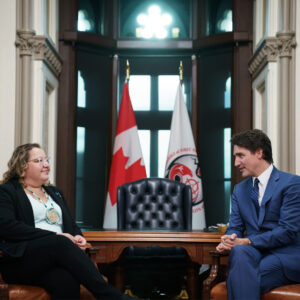
Since coming to office, the Obama administration has perhaps done more than any that has come before it to keep up appearances of good relations between the American government and its “domestic dependent nations”, despite the long list of grievances held by Onkwehon:we that are not reflected in the photo-ops and official press releases.
This year was no exception at the day-long Tribal Nations Conference in Washington, D.C., the fifth event of its kind since Obama became President.
Obama opened his introduction by establishing some legitimacy for himself: “As a proud adopted member of the Crow Nation, let me say kaheé – welcome – to all of you.”
Obama was quick to highlight the appointments of “Native Americans” to various posts in his administration. Obama used most of his speech to underscore what his administration was doing for Onkwehon:we, paid some lip service to disproportionately high poverty on reserves, and thanked the “tribal nations” for fighting in the Second World War and in Korea.
Special mention was made of the Haudenosaunee at the event, with Obama drawing attention to the principles of a covenant chain: “I know we’ve got members of the Iroquois nation here today. And I think we could learn from the Iroquois Confederacy, just as our Founding Fathers did when they laid the groundwork for our democracy. The Iroquois called their network of alliances with other tribes and European nations a “covenant chain.”
Each link represented a bond of peace and friendship. But that covenant chain didn’t sustain itself. It needed constant care, so that it would stay strong. ”
But the problems raised by representatives of “tribal organizations” behind the scenes suggested a chain that was continuing to rust.
Indian Country Today has reported that representatives “pummeled” the administration in closed and open sessions around the capping of contract support costs (CSC) reimbursements to “tribes” despite Supreme Court rulings to the contrary. Billions of dollars are owed to tribal organizations for these costs that they have already been forced to pay. Attendees were also reported to be concerned about all the money spend travelling to a conference that Onkwehon:we have virtually no input.
Indian Country Today reported that Edward Thomas, president of the Central Council of Tlingit and Haida Indian Tribes of Alaska, decided not to attend because the conference would just be another “photo op and publicity staged event as opposed to one where we have the opportunity to tell [the president] directly that his team are not carrying out his promises to Native Americans.”
Representatives also criticized the Obama administration for a lack of support to Onkwehon:we education, for initiatives by the IRS to unjustly tax tribal organizations, and the administration’s support for the budgetary sequestration of tribal money that is supposed to be protected by treaty obligations.
In addition to these concerns, tribal representatives to the conference raised concerns about the insufficiency of consultation and lack of Onkwehon:we representation on the White House Council on Native American Affairs.
Obama promised “Next year, I’ll make my first trip to Indian Country as President.” He did not specify which “country” that would be, but it would be his first since campaigning for the President in 2008.








Comments are closed.